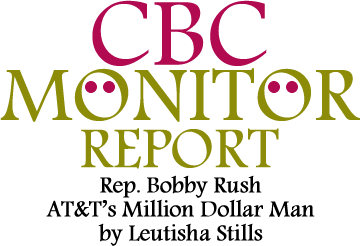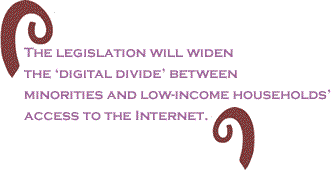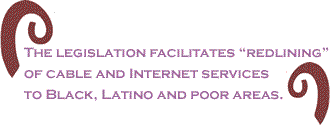
|
|||||||||||||||||||||
 |
|||||||||||||||||||||
 |
|
The Congressional Black Caucus has long advertised itself as not only being the “Conscience of the Congress,” but also as the venue that is committed to looking after the best interests of the African-American community and ensuring that issues of relevance to African Americans be heard. So when one learns how the CBC promotes itself, you would expect them to “walk their talk” in terms of legislation introduced or sponsored in the U.S. House of Representatives; that they would look out for the best interests of the constituencies they represent. For the most part, your expectations would be met, but in recent times, you will have experienced grave disappointment. The deepening illness within the Congressional Black Caucus continues to metastasize like an out-of-control-cancerous growth which can only be halted and heeled by emergency surgery. Cases in point: the Immigration
Bill that turns illegal immigrants into felons, and the
most recent Cable and Telecommunications Bill known as COPE,
the Communications Opportunity, Promotion and Enhancement Why, Bobby, Why? First, let’s discuss the COPE Act. Corporate lobbyists and the congresspersons who love them are engaged in a sweeping and secretive rewrite of the laws that currently govern the Internet and cable TV providers. The proposed new regulations will end the free and equal access to the Internet enjoyed by small scale publications such as Black Commentator. Among much else, owners of the Internet’s “backbone” will be permitted to discriminate in favor of content providers, such as Fox or Disney, who can afford to pay premiums to deliver content to users. Current laws that require cable TV providers to “build out” to inner cities inhabited by ethnic groups, as well as community access agreements painstakingly negotiated by hundreds of local communities with the cable industry, will be invalidated. Some of the bill’s sponsors are the usual suspects – Republican Speaker of the House Dennis Hastert (R-IL) and the oil-soaked Joe Barton (R-TX). But, until recently, this bill had no Democratic sponsors, and therefore, no “bi-partisan” support.
Enter, Rep. Bobby Rush, who agreed to co-sponsor this industry-crafted bill. Until this week, it was a mystery why the former Black Panther would stoop to carrying water for the telecom giants – but no longer. “Rush's million-dollar conflict?” read the headline of the April 26 Chicago Sun-Times.
While the legislation has the usual misleading name and acronym (COPE), and was the subject of a full hearing of the House Subcommittee on Telecommunications and the Internet on March 30, 2006, it has yet to be assigned a bill number. As BC went to print, it is still known as “HR___”. A House Staffer at another Illinois representative’s office informs us that since the legislation has not been assigned a number, it will “inhibit citizens from calling and emailing their Representatives and expressing opposition to the legislation.” Rep. Rush is of the opinion that his constituency doesn’t need a “build-out” provision for Internet usage, but instead needs lower prices for cable service. He claims the bill will create national video franchises and spur competition to cable from telcos and others.
We have heard it all before. In reality, every industry-backed bill has done the exact opposite, leading to further consolidation. The lack of a “build-out” provision in the bill means that ethnic communities and their residents will wind up with less access to cable and broadband. Currently, many cities and towns require that most or all neighborhoods be served by telecom companies. Under Bobby Rush’s bill, this will no longer be the case. In effect, the legislation facilitates “redlining” of cable and Internet services to Black, Latino and poor areas. Think of it as living in certain neighborhoods where the car insurance rates will result in residents paying more or less for insurance premiums based on their addresses. Usually, such industry “redlining” practices are against the law, however, under the COPE act such practices would be legal. Jeanine Kenney, of the Consumers Union, argued during hearings on the bill that, “the fees charged to content and service providers will inevitably be passed onto consumers who have already paid for high-speed (Internet) access.” Paul Misner of Amazon.com testified that consumers face “…at best, an oligopoly, and for the vast majority of Americans, a duopoly of the local phone and cable companies” which would leave consumers with “fewer services, higher prices, or both.” All who testified against this bill emphasized the measure’s use of language such as “network neutrality” while the bill would actually not offer such neutrality, and would most likely leave consumers at the mercy of the cable and Internet providers. We at CBC Monitor were puzzled as to what would compel Rep. Rush to even consider supporting such egregious legislation, let alone be pawned as a Democratic co-sponsor of this bill. Now we know why. Ford’s follies Rep. Harold Ford never ceases to surprise us, with his seemingly infinite capacity to betray the interests of his Black Memphis constituents.
The U. S. Senator-wannabe voted in favor of the Immigration Bill that criminalizes illegal immigrants without giving them an opportunity to become legal – the only member of the CBC to do so. We have already seen how seriously immigrants are taking this attempt to legalize bigotry and discrimination, sponsored by the equally odious Rep. Tom Tancredo (R-CO). Latino communities nationwide took a page from African-Americans’ own history book and got in the streets, organizing protests and urging their Representatives not to support this legislation.
Sad Conclusions Unfortunately, we know all too well of Harold Ford’s tendency to vote in an ever-rightward trajectory. He seems capable of anything, even slinging his own grandmother under the racial bus by claiming she was a Caucasian who, we are expected to believe, willingly chose to abandon white privilege and endure bigotry and Jim Crow segregation by passing for Negro. Somehow, Ford believes the fantastic fairy tale will curry favor with White voters throughout Tennessee. Ford reveals himself as an amoral human being – and among the most execrable members of the United States House of Representatives. However, the case of Rep. Bobby Rush, the former Black Panther and current minister, is more troubling. We at CBC Monitor are deeply saddened at his alliance with Big Telecom. It seems the CBC may have lost a progressive, and gained another corporate operative. (As BC went to print, we learned that two Blacks on Rep. Rush's committee joined two other Democrats in voting for the GOP/teleco industry's bill. The CBC members are Edolphus Towns (NY) and Albert Wynn (MD). The bill now goes to the full House. - The Editors.) Leutisha Stills can be reached at [email protected]. The CBC Monitor's website is cbcmonitor.voxunion.com. |
|
| Home | |
Your comments are always welcome. Visit the Contact Us page to send e-Mail or Feedback or Click here to send e-Mail to [email protected] e-Mail re-print notice
If you send us an e-Mail message we may publish all or part of it, unless you tell us it is not for publication. You may also request that we withhold your name. Thank you very much for your readership. |
|
| April 27, 2006 Issue 181 |
||||||||||||||
|
||||||||||||||
|
||||||||||||||
| Printer Friendly Version of article | ||||||||||||||
 |
||||||||||||||
 |
||||||||||||||
| |
||||||||||||||
| |
||||||||||||||

































